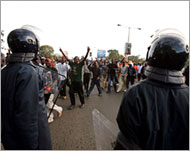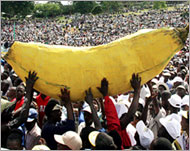Kenyan government risks poll defeat
Kenya’s government risks an embarrassing defeat in a constitutional referendum on Monday seen as a test of strength ahead of elections in 2007, analysts have said.

A rally in Nairobi held by foes of President Mwai Kibaki’s new constitution on Saturday in a final push for votes was markedly bigger than a rival public gathering of the “Yes” camp.
Rallies in the capital often reflect political affiliation in the rest of Kenya, the most developed country in east Africa.
“I conclude that if there is a solid voter turnout, the nos will have it,” said constitutional lawyer Patrick Lumumba.
The opposition gathering drew an estimated 30,000 supporters against 12,000 for the government event.
“A referendum is all about numbers, and the opposition seemed to attract more people,” said Ludeki Chweya, who teaches government at the University of Nairobi.
New constitution
Kibaki, 74, is leading the campaign for a new constitution, billed as an effort to improve governance in a country impoverished by decades of autocratic rule and theft of state funds under his predecessor Daniel Arap Moi.
 |
|
The opposition rally drew an |
Critics argue the vote is an attempt to silence cabinet dissidents who say he has concentrated power in a clique from his Kikuyu tribe and been complacent in the fight against graft.
The tussle between yes and no camps has deepened a split in Kibaki’s fractious government and injected an ugly dose of tribalism into politics ahead of the 2007 polls.
Riots convulsed Nairobi for three days in July when the text of the constitution was published, killing at least one person.
Another eight have died in riots around campaign rallies.
The main controversy over the charter has to do with the powers of the president, with critics saying it ignores the desire of most Kenyans to balance those powers with a strong prime minister’s post and other checks.
Symbol
Kibaki’s campaign, which uses the symbol of a banana, seems to be flagging.
Kenyans say that is due mostly to disappointment with his record on creating jobs and fighting high-level corruption.
The main opposition party and a dissident faction from Kibaki’s ruling National Rainbow Coalition (NARC) are opposing the new charter under the symbol of an orange.
The fruits were chosen by the electoral commission to help illiterate voters.
“The speakers at the Orange rally seemed to address issues that affect ordinary people. In contrast, the Banana side were a little out of focus,” said Chweya.
Kibaki’s own large Kikuyu community in central Kenya is expected to support the constitution out of ethnic solidarity and because he has provided new roads for the region.
Hand-outs
Kibaki has also handed out state property and jobs to communities across Kenya recently in what experts say is an effort to solicit votes for the yes camp.
 |
|
Kibaki’s campaign uses the |
“We’ve seen a lot of visits to State House, and districts dished out, and the timing may influence voters. That is something of concern. That is an unfair advantage,” said Koki Muli, director of Institute for Education in Democracy, which observes elections.
“The government has resolved to entice voters using state resources that the other side does not have.”
Chief election officer Samuel Kivuitu has urged voters to resist casting their ballot along ethnic lines and warned that further violence would lead Kenya “to hell”.
About 19,000 local observers and between 150 and 160 diplomats will monitor the poll, which will take place between 7am (0400 GMT) and 5pm. More than 11 million Kenyans are eligible to vote, with results expected early on Tuesday.